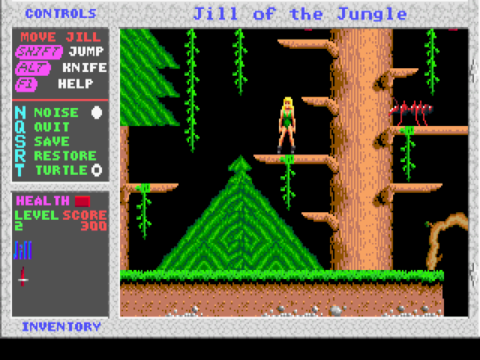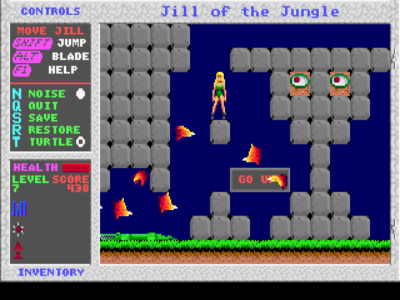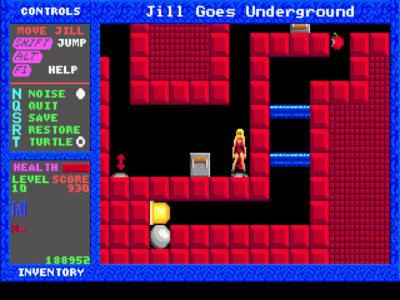
Jill of the Jungle
Written by: Stoo
Date posted: October 15, 2020
- Genre: Action
- Developed by: Epic Megagames
- Published by: Epic Megagames
- Year released: 1992
- Our score: 5
These days Epic Games most prominent work is probably the online multiplayer shooter Fortnite. I’m barely aware of what it’s about; I’m fast closing on 40, have virtually no time to keep up with developments in gaming and have never been interested in multiplayer anyway. Still, the kids seem to enjoy it and I’m not the sort to rant on about how we were Real Gamers in the 90s because we played Wolfenstein 3D.
Anyway before Battle Royale games, Epic earned their place as giants of PC gaming by creating the Unreal Engine. This powered a series of the same name, the first of which wowed us with its graphics back in 1998. The engine, now in its fourth iteration, went on to power a vast host of games from many third parties, including classics like Bioshock and Deus Ex.
That’s a hell of a legacy, but before all that Epic had a more humble start. Starting around 1992 they developed and published platform games and scrolling shooters, for relatively underserved MS DOS gamers. They were the upstart rivals to Apogee software, who had been by that point been publishing similar games for a few years. They also made good use of Apogee’s shareware model, whereby a large chunk of each game (more than a mere demo) was given away for free.
Earlier this year Rik covered Jazz Jackrabbit, their most significant platformer. So I thought it would be interesting to go a little further back, almost to Epic’s first days. Well, also I noticed that gog are giving this one away for free.
I’m guessing Jill is inspired by legends of the Amazons, but I couldn’t tell you much about her. Even by the standards of the day, where the story and setting consisted of two pages of text, we’ve given virtually no information about her heroine or her quest. Still, kudos to Epic founder Tim Sweeney for creating a game with a solo female protagonist, something we rarely saw back then.
The graphics use the VGA standard, which Apogee had been slow to adopt. Unfortunately despite those extra colours it looks fairly plain. Levels are clearly built out of square blocks, sprites are a bit lacklustre and backgrounds are minimal. In fact it makes me slightly regret criticising Apogee, since even with just 16 colours games like Commander Keen: Goodbye Galaxy or Cosmo’s Cosmic Adventure boasted charming and vibrant artwork. Jill also lacks the smooth scrolling that the iD software wizards created for Keen – movement seems to be in half-block steps.
I’m the sort of guy who tries to look for positives though, so I’ll point out there’s a kind of sunset effect on some levels which is pretty cool. Also the music is great, some of the best adlib tunes I’ve heard in a while. That does help add some atmosphere, turning generic block tunnels into more of an eerie underground setting.
There are two thrown weapons available, one of which is a bouncing shuriken. The other flies out then returns to you, so with some clever movement you alter its path to strike enemies above and below. It’s a neat feature, although it’s frustrating that you need to manipulate it just to hit small enemies on the same level as you, since you can’t crouch and fire.
A lot of your enemies are wild creatures, like overgrown slugs. You can in fact turn into an animal yourself by grabbing powerups, which transform Jill’s abilities. The firebird can flap up to high spots, and can spam blasts of fire like something out of a shoot’em up. The fish is basically the same for underwater. Then you have a frog which, er, hops quite high. Which is useful sometimes!
Usually you need to hunt for at least one or two keys, sometimes you’re searching thoroughly for several to get past a row of locked doors. Many levels revolve around puzzle solving – nothing really taxing, but enough to force you to be methodical in exploring. You might have to contend with a maze of narrow passages, or climbing sections where most platforms appear and disappear, forcing you to reach the few fixed platforms in time.
In fact JotJ is fairly easy overall; it took this Dad Gamer only a few snatched hours to complete. Okay, I’m going to admit to save-scumming a few annoying jumps, or those devil things that for some reason (intentional or glitch) are immune to your weapons in chapter three. Still the levels are fairly short, most enemies are simple to deal with, and the game is generous with health boosts.
There are a few bugs and glitches along the way – at least once I got stuck at a locked door with no way to reach more keys. Also water serves as both a background feature and a hazard, and it’s not always entirely clear what marks the difference. A few times I’d hit jump, standing on a platform in front of a waterfall, to be bizarrely met with instant death.

I have no idea what those creepy eyes are about.
Two years later, Jazz Jackrabbit would challenge Apogee platformers by taking full advantage of VGA. It boasts highly appealing artwork with big cartoonish sprites, and blindingly fast, silky-smooth scrolling. It also featured an eye-catching, if somewhat derivative mascot to focus our attention. I prefer the whimsical EGA charms of Keen myself, but can’t deny Jazz comes close to the performance of a console game. Which, after all, is the goal this whole shareware scene was aspiring towards.
Jill however lacks the distinguishing features of Jazz. There isn’t much remarkable about the older game in terms of artwork or features, and it all feels just a bit basic and amateurish. To be fair, we should remmeber that it it was an early effort by a very small team; I believe Sweeney wrote it himself, and just got some help in with the art and music. Also some of my fellow MS DOS nerds must have been getting their action gaming fix, if it sold enough copies for Epic to continue and grow.
So it’s not a terrible platformer at all, just in my opnion a fairly average one. To give some perspective let me try and put it on the Apogee ladder – I’d go for somewhere near that guy with the mullet and the very first bleepy Duke Nukem, a distance behind Cosmo and significantly beneath Goodbye Galaxy. So then, worth a quick look for shareware fans, but unless you are completist the first chapter might be enough for you.



 Posts
Posts